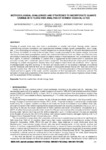Mostrar o rexistro simple do ítem
Methodological Challenges and Strategies to Incorporate Climate Change into Flood Risk Analysis of Spanish Coastal Cities
| dc.contributor.author | Bermúdez, María | |
| dc.contributor.author | Cea, Luis | |
| dc.contributor.author | Losada, Miguel Ángel | |
| dc.contributor.author | Puertas, Jerónimo | |
| dc.contributor.author | Ortega Sánchez, Miguel | |
| dc.date.accessioned | 2024-10-03T15:36:59Z | |
| dc.date.available | 2024-10-03T15:36:59Z | |
| dc.date.issued | 2019 | |
| dc.identifier.citation | Bermúdez, M., Cea, L., Losada, M. A., Puertas, J., Ortega-Sánchez, M. (2019). Methodological Challenges and Strategies to Incorporate Climate Change into Flood Risk Analysis of Spanish Coastal Cities. Proceedings of the IAHR World Congress, 275-282. https://doi.org/10.3850/38WC092019-0669 | es_ES |
| dc.identifier.uri | http://hdl.handle.net/2183/39410 | |
| dc.description.abstract | [Abstract:] Flooding of coastal cities may arise from a combination of coastal and inland flooding, which requires understanding complex correlations and dependencies between multiple agents (precipitation, storm surge, tide...), and conducting joint analysis of future changes due to climate change. In this work we explore some of the intrinsic variabilities of some of the multiple drivers usually associated to the climate change: increased intensity of storms (wind, precipitation, waves, etc.) and concomitant sea level rise. Mean sea level rise alone will already increase the probability of coastal inundation relative to fixed elevations from a combination of such flood agents. In addition, vulnerability of coastal cities is aggravated by the concentration of population and economic activity, with a continued upward trend in projection. The above flood risk drivers pose an inevitable challenge to coastal management. Coastal cities must adapt to future flood risk conditions, which requires knowledge-based long term planning. In this work we discuss some of the practical challenges encountered and the strategies and methods that can be adopted to incorporate climate change into flood risk analysis of Spanish coastal cities. We focus on the following aspects: (1) The characterization of the joint behavior of the inland and marine agents at the coast, and the evaluation of their hydrodynamic interactions; and (2) The derivation of local-scale projections of the required surface variables from the output of global climate models, and the assessment of their uncertainty. | es_ES |
| dc.description.sponsorship | M.Bermúdez gratefully acknowledges funding from the European Union’s Horizon 2020 research andinnovation programme under the Marie Skłodowska-Curie grant agreement Nº 754446 and UGR Research andKnowledge Transfer Found – Athenea3i. | es_ES |
| dc.language.iso | eng | es_ES |
| dc.publisher | IAHR | es_ES |
| dc.relation.uri | https://doi.org/10.3850/38WC092019-0669 | es_ES |
| dc.subject | Flood risk | es_ES |
| dc.subject | Coastal cities | es_ES |
| dc.subject | Climate change | es_ES |
| dc.subject | Spain | es_ES |
| dc.title | Methodological Challenges and Strategies to Incorporate Climate Change into Flood Risk Analysis of Spanish Coastal Cities | es_ES |
| dc.type | conference output | es_ES |
| dc.rights.accessRights | open access | es_ES |
| UDC.startPage | 275 | es_ES |
| UDC.endPage | 282 | es_ES |
| dc.identifier.doi | 10.3850/38WC092019-0669 | |
| UDC.conferenceTitle | IAHR World Congress (38th. 2019. Panama) | es_ES |
| UDC.coleccion | Investigación | es_ES |
| UDC.departamento | Enxeñaría Civil | es_ES |
| UDC.grupoInv | Enxeñaría da Auga e do Medio Ambiente (GEAMA) | es_ES |
| UDC.institutoCentro | CITEEC - Centro de Innovación Tecnolóxica en Edificación e Enxeñaría Civil | es_ES |
| dc.relation.projectID | info:eu-repo/grantAgreement/EC/H2020/754446 | es_ES |
Ficheiros no ítem
Este ítem aparece na(s) seguinte(s) colección(s)
-
Investigación (ETSECCP) [826]






